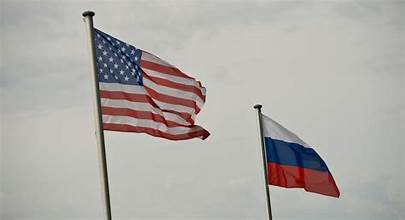The U.S. has accused Russia of launching a space weapon into low-Earth orbit, a claim Russian officials have dismissed as “fake news.” The ongoing dispute highlights tensions between the two nations over space weaponry.
During a news briefing on Tuesday, Pentagon spokesperson Maj. Gen. Pat Ryder stated that the weapon has the capability to attack other satellites. This assertion aligns with earlier comments from the U.S. ambassador to the UN, who claimed on Monday that Russia had launched an anti-satellite weapon.
“Russia launched a satellite into low Earth orbit that we assess is likely a counter space weapon, presumably capable of attacking other satellites in low Earth orbit,” Ryder said. He noted that the weapon was launched into the “same orbit” as a U.S. government satellite.
The U.S. is closely monitoring the situation and is prepared to protect the “space domain,” Ryder added. The satellite weapon was reportedly launched on May 16 aboard a Soyuz rocket from Russia’s Plesetsk launch site.

Moscow, however, denied the U.S.’ claims, deriding them as disinformation.
“I don’t think we should respond to any fake news from Washington,” Russian Deputy Foreign Minister Sergei Ryabkov was quoted as saying by the Interfax news agency.
“The Americans can say whatever they want but our policy does not change from this,” said Ryabkov, adding that Moscow had “always consistently opposed the deployment of strike weapons in low-Earth orbit.”
The Kremlin confirmed it launched a rocket on May 17 that had a spacecraft on board but gave no details about what it was for.
The U.S. and Russia have been clashing over the issue of space weapons at the UN in recent weeks, with a U.S.-backed resolution and Russia-backed resolution to ban space weapons failing to be passed by the Security Council (UNSC). Both countries are accusing the other of trying to militarize space, even as they both present resolutions calling for bans.
The first resolution, introduced by the U.S. and Japan, was put to a vote at the United Nations Security Council (UNSC) on April 24. The resolution aimed to reaffirm the Outer Space Treaty of 1967, which prohibits states from placing nuclear weapons and weapons of mass destruction in space and ensures that outer space remains a domain held in common for all humanity. This means no state can claim sovereignty or annex space.
Russia opposed the resolution, arguing that it was unnecessary since the Outer Space Treaty is still in effect. The Russian representative accused the U.S. and Japan of “cherry-picking” by focusing solely on nuclear and mass destruction weapons instead of advocating for a ban on all types of weaponry in space. This selective approach, according to Russia, was an attempt to “camouflage their lack of interest” in ensuring peace in outer space.
Russia, a permanent member of the UNSC with veto power, voted against the draft resolution, effectively blocking it. All other members supported the resolution, except for China, which abstained.
In response, Russia introduced its own draft resolution calling for a ban on all space weapons, including weapons of mass destruction. The U.S. representative criticized this move as “disingenuous.” During this meeting, the U.S. ambassador first alleged that Russia had launched a space weapon on May 16.
Numerous member states noted that the text of Russia’s resolution closely mirrored the U.S.-Japan resolution that Russia had vetoed. When put to a vote on Monday, Russia’s resolution failed to pass, with seven states, including the U.S., voting against it.
Ecuador’s ambassador remarked that the outcome was “largely predictable” and criticized the UNSC as becoming “just one more arena that exposes today’s geopolitical tensions.”
Paul Meyer, Canada’s former ambassador for disarmament and a fellow at the Vancouver-based Outer Space Institute, expressed his disappointment in a comment to the Associated Press. “We have this negative, squabbling attitude among leading space powers that seem more interested in scoring points off their adversaries rather than engaging in constructive dialogue,” he said.












